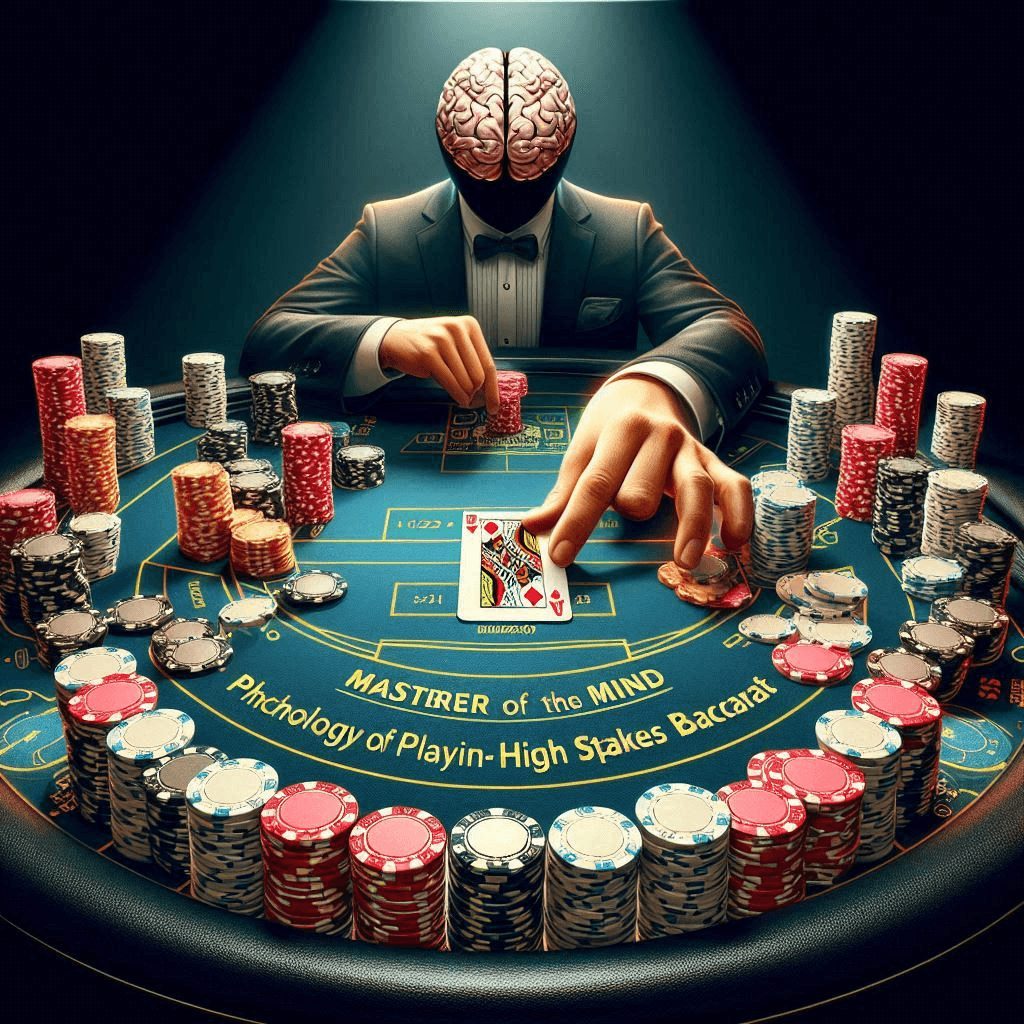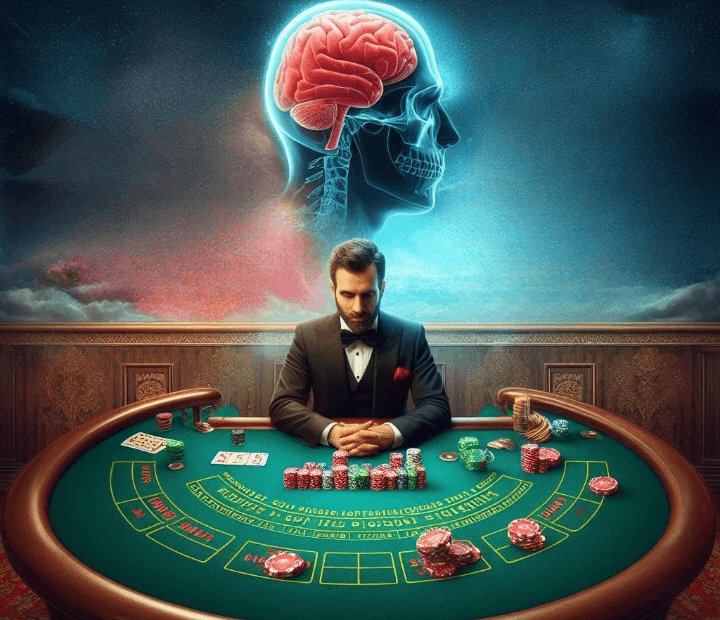In the world of high-stakes baccarat, few games captivate the minds of players and spectators alike as baccarat. This elegant and sophisticated card game, with its roots tracing back to the 15th century, has long been associated with the elite and the daring. However, the true mastery of high stakes baccarat lies not only in the mechanics of the game but in the intricate workings of the human psyche.
The Psychology of High Stakes Baccarat
At its core, is a game of chance, where the outcome is determined by the cards dealt. Yet, the most successful baccarat players understand that the game is as much a mental exercise as it is a physical one. The ability to remain calm, focused, and disciplined in the face of high-stakes pressure is a hallmark of the true baccarat master.
The Importance of Emotional Control
One of the most critical aspects of game mastery is the ability to control one’s emotions. The game’s high stakes baccarat nature can be a breeding ground for anxiety, fear, and even greed, all of which can cloud a player’s judgment and lead to reckless decision-making. The most accomplished baccarat players have developed a keen sense of emotional intelligence, allowing them to navigate the emotional turbulence of the game with grace and composure.
The Power of Concentration
The ability to maintain laser-like focus is paramount. The game moves quickly, with each decision carrying significant consequences. Successful high stakes baccarat players have honed their powers of concentration, allowing them to block out distractions and remain entirely present in the moment. This focus not only enhances their decision-making but also enables them to anticipate the flow of the game and capitalize on subtle shifts in momentum.
The Mastery of Probability
Its like many casino games, is governed by the laws of probability. While the outcome of each hand is ultimately determined by chance, the most proficient high stakes baccarat players have developed a deep understanding of probability and its role in the game. They are able to analyze the odds, recognize patterns, and make informed decisions that increase their chances of success.
The Importance of Discipline
Discipline is a critical component of game mastery. The game’s high stakes baccarat nature can be a powerful temptation, luring players into making impulsive or reckless decisions. The most successful game players have cultivated a strong sense of discipline, enabling them to stick to their strategies, manage their bankrolls, and resist the allure of short-term gains.


The Psychological Factors in Baccarat
Risk Perception and Tolerance
One of the key psychological factors at play in high stakes baccarat is the player’s perception and tolerance of risk. Some individuals are naturally drawn to high-risk, high-reward scenarios, while others prefer a more cautious approach. The most successful baccarat players have a nuanced understanding of their own risk tolerance and are able to adjust their strategies accordingly.
Cognitive Biases and Decision-Making
Like all human endeavors, high stakes baccarat is susceptible to the influence of cognitive biases. Players may fall prey to the gambler’s fallacy, the belief that past losses or wins will somehow affect the outcome of future hands. They may also be swayed by confirmation bias, the tendency to seek out and interpret information in a way that confirms their existing beliefs. The most skilled baccarat players are aware of these biases and work to counteract their influence.
Emotional Intelligence and Resilience
As mentioned earlier, emotional control is a critical component of baccarat mastery. The most successful players have developed a high degree of emotional intelligence, allowing them to recognize and manage their own emotional responses to the game’s ups and downs. They are also highly resilient, able to bounce back from losses and maintain a positive, focused mindset.
Visualization and Mental Preparation
Top-level high stakes baccarat players often engage in visualization and mental preparation techniques to enhance their performance. By mentally rehearsing their strategies, visualizing successful outcomes, and practicing mindfulness exercises, they are able to enter the game in a state of optimal focus and confidence.
Strategies for Mastering the Mind in Baccarat
Developing a Winning Mindset
The foundation of high stakes baccarat mastery lies in the development of a winning mindset. This involves cultivating a positive, confident, and disciplined approach to the game. Players should strive to maintain a clear, focused state of mind, free from the distractions of emotions and external factors.
Implementing Proven Strategies
Successful game players have typically honed a set of proven strategies that they apply consistently. These strategies may involve bankroll management, card counting, pattern recognition, or other techniques that increase the player’s chances of success. By mastering these strategies and applying them with discipline, players can increase their odds of winning in the long run.
Embracing Continuous Learning
The world of high stakes baccarat is constantly evolving, with new strategies, techniques, and insights emerging all the time. The most accomplished players understand the importance of continuous learning and adaptation. They are constantly seeking out new information, experimenting with different approaches, and refining their skills to stay ahead of the curve.
Practicing Mindfulness and Relaxation
In the high stakes baccarat world of game, the ability to remain calm and centered is a crucial asset. Successful players often incorporate mindfulness and relaxation practices into their routine, such as meditation, deep breathing exercises, or visualization techniques. These practices help players maintain a clear, focused mind and manage the psychological stress of the game.
Seeking Mentorship and Coaching
One of the most effective ways to master the psychological aspects of game is to seek out the guidance of experienced players or professional coaches. These mentors can provide valuable insights, share their own strategies and techniques, and help players develop the mental skills necessary for success.
Conclusion
The mastery of high stakes baccarat is a fascinating intersection of skill, strategy, and psychological prowess. By understanding the key psychological factors at play and implementing proven techniques for mental preparation and emotional control, players can elevate their game and achieve new levels of success in this captivating card game.
As the world of high stakes baccarat continues to evolve, the most accomplished players will be those who have honed their mental faculties, embraced the power of the mind, and consistently outmaneuvered their opponents through sheer mental mastery.
FAQs
-
What are the key psychological factors that influence success in baccarat?
The most important psychological factors in baccarat include emotional control, concentration, probability analysis, and discipline.
-
How can players develop a winning mindset for baccarat?
Developing a winning mindset involves cultivating a positive, confident, and disciplined approach to the game, as well as maintaining a clear, focused state of mind.
-
What are some proven strategies for mastering the psychological aspects of baccarat?
Proven strategies include implementing bankroll management techniques, practicing mindfulness and relaxation, seeking out mentorship and coaching, and continuously learning and adapting to the evolving game.
-
How can players use visualization and mental preparation to enhance their baccarat performance?
Players can use visualization and mental preparation techniques, such as mentally rehearsing strategies, visualizing successful outcomes, and practicing mindfulness exercises, to enter the game in a state of optimal focus and confidence.
-
What role do cognitive biases play in baccarat, and how can players overcome them?
Cognitive biases, such as the gambler’s fallacy and confirmation bias, can significantly influence a player’s decision-making in baccarat. The most skilled players are aware of these biases and work to counteract their influence through disciplined, data-driven decision-making.
